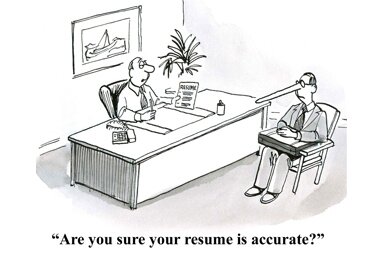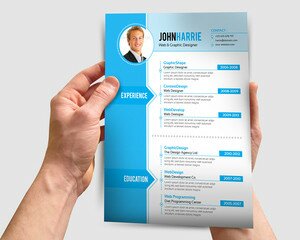 Here at One Life Success we believe that one of the most important parts of being successful is enjoying the success you’ve achieved. And although that ‘reward’ shouldn’t be money alone, it is an element of life that is impossible to ignore when you’re climbing to the top.
Here at One Life Success we believe that one of the most important parts of being successful is enjoying the success you’ve achieved. And although that ‘reward’ shouldn’t be money alone, it is an element of life that is impossible to ignore when you’re climbing to the top.
The truth is, money doesn’t buy happiness but it does lift ideas off the ground and that’s why I’ve included a post today about writing a winning CV because sometimes the basics are the best things to build upon when you’re aiming for the biggest and the best. In this case, securing the perfect job could be a stepping stone to that dream of yours – and thus, it’s important to do it right!
Seven Steps to a Winning CV…
1) Research The Company
 What’s important to remember when writing a CV, is that the employer in charge of hiring you has a job too and that job is to hire individuals who will help run their business smoothly. Before sitting down and writing anything, try and understand what kind of person the company is looking for and whether you’d fit that criteria.
What’s important to remember when writing a CV, is that the employer in charge of hiring you has a job too and that job is to hire individuals who will help run their business smoothly. Before sitting down and writing anything, try and understand what kind of person the company is looking for and whether you’d fit that criteria.
Sending out fifty of the same CV is time-economic, sure, but in the long run it won’t be worth your time because every company is run by a different individual with a different aim behind the job vacancy. In light of this you should always, always, always tailor your strengths to the company and its vacant role specifically. And that’s why research into the company and its vacant role is so imperative.
A good way to go about company research is, obviously, to have a read through their website. But for higher end positions, this probably isn’t the most efficient method because one hundred and one other applicants will have done exactly the same thing!
Wikipedia is also another no-no. Not only may the research be inaccurate, but it will also consist of facts. And facts are all very well – they show that you have dedicated time to the job at hand already – but they won’t give you a true feel for the company and what it wants to achieve with your help.
The best kind of research comes from your own assumptions and decisions. Instead of heading for the web, why not try talking to previous employees or taking a look at their catalogues to see what kind of products they offer?
In this way you’ll still be clued into what the company is all about and what kind of person they look to hire but you’ll also have lots of questions to ask in the interview and more time to plan how you’ll talk about yourself and how you suit the job role (rather than how you can regurgitate all the facts you memorised!)
2) Understand What The Job Could Do For You
Don’t apply to a job that you know won’t make the most of your talents because, although work isn’t everything, work does take up a large proportion of your day and can shape your attitude towards your work outside of the office too.
If your job drains everything that’s good about you, then you won’t feel motivated to push yourself further outside of the office. ‘Drained’ is a trait that never got anyone, anywhere. So don’t waste your time on a path that will only make the financial (and consumption) areas of your life richer. On the flip side, also be aware of the opportunities available from the job you’re applying for.
If there’s a certain contact you could make or a course you could take that would help you get one step closer to the dream then start working towards it from day one. Choosing to apply to a job with opportunities is, in the long run, a richer investment of your time than simply a job with a good pay. You’ll also find that you enjoy work and perform better, when you’ve got a solid motivation to do so.
3) Select Your Presented Education, Interests and Work Experience Details to Suit the Company
 After researching the company you should be well clued in to what they want from you as a future employee. In light of this, it’s time to channel your inner editor and adapt the experiences and education you have received to suit that research.
After researching the company you should be well clued in to what they want from you as a future employee. In light of this, it’s time to channel your inner editor and adapt the experiences and education you have received to suit that research.
If your applying for an engineering job and you’ve only worked in a school – that’s okay. Think beyond ‘school’ and think more about the skills you used at the school that could be applied to the job such as ‘team work’, ‘creativity’ or even, if your scraping the barrel a bit, ‘awareness of safety hazards’.
In Educational terms, it’s also a good idea to highlight subjects that are similar to those being asked of you for example ‘straight A’s at A-Level including IT and Mathematics’ if your still going for that Engineering job. In this way you are still telling the full truth and won’t be caught out in the interview, but you’re pushing forward only the key elements of your character which would make you perfect for the job role that’s on offer.
In these early stages don’t think about what your competition does or doesn’t have. Only think about how you can show the employer you have the skills, the talent and the drive to give them what they want in return for your wages.
4) Eliminate Any Unimportant Details
 Companies will have loads and loads and loads of applications to flick through, thus, a long application, full of flowery language and hyperbole, just simply won’t catch the eye.
Companies will have loads and loads and loads of applications to flick through, thus, a long application, full of flowery language and hyperbole, just simply won’t catch the eye.
Don’t try and be clever, but aim instead to stand out from the crowd. Strike the right tone, make every word count and, most importantly, eliminate any unimportant details.
A gaming company isn’t interested to know that you make a mean chocolate cake. Equally, a cookery business doesn’t want to know that you ‘bash’ COD in your spare time. So don’t write it!
Applications are like first impressions – you want to leave a positive impression, sure, but you don’t want to tell the stranger everything there is to know about yourself in ten minutes.
I can’t stress enough how important it is to be a filter and only give the employer what they need to know, what’s important about you, and nothing more. As long as the details you give are strong, accurate and make sense it’s okay to be condensed, in fact the reader will probably thank you for it.
5) Don’t Just Describe, Explain
Don’t just state what you are, but prove that you are how you say. So you’re confident? How have you shown this? Have other people seen this trait in you? Through which experience did you best demonstrate this skill? And how?
The easiest way to back up what you say is to use work experiences or a reference, but you can use any method you like as long as it’s concise and valid. Additionally, don’t be afraid to prompt reference givers in a certain direction or to talk about yourself in a way that may seem boastful.
Companies (and colleges if you’re a younger reader) want to know what you can do for them, not what you think that you’d kind of like to do for them. In this sense it’s worth looking up some ‘action words’ that will make you stand out.
Did you ‘kind of help out for a week at some bake sale’ or did you ‘voluntarily take charge as the president of the RSPCA fundraiser’? Chanel your inner American and be confident in who you are and what you have to offer. Even the tone of your writing here can offer evidence for your ‘personal profile,’ so ensure that your CV isn’t merely a list of traits that make a good worker because anyone could have written those.
6) Be Yourself!
You should never lie on a CV for three reasons. Number one, it’s bad ethic. Number two, it might get you the job that doesn’t suit you as well as you think. Number three, unless you’re a budding actor/actress I can guarantee you’ll mess up in the interview when they call you up on it. And they will call you up on it.
 When you’re writing your CV imagine that the bosses behind those doors are like those on the Apprentice. That way you’ll be prepared for a hard-core grilling and feel pleasantly surprised and relaxed when someone much kinder opens the door to their office.
When you’re writing your CV imagine that the bosses behind those doors are like those on the Apprentice. That way you’ll be prepared for a hard-core grilling and feel pleasantly surprised and relaxed when someone much kinder opens the door to their office.
A CV is a request, a request for the employer to consider you as the man (or woman) for the job. You want to be interview-ready from the second you post your application, so again, don’t compromise your chances with a little white lie. A rejection letter is always better than the walk of shame – you can always rewrite a CV but you can’t rewrite history or your professional reputation.
7) You don’t have to be a Techno Wizard… but it helps to be in the know.
The world is modernising at an unbelievably rapid pace and the jobs available to us are quickly following suit. What employers are looking for in a candidate is evolving and as business progresses, there is a greater focus on diversity, technology and customer service than ever before.
In this sense, it’s your job as a potential employee to be able to keep up with the market. The majority of bosses want customers to leave with their products feeling like they have gained something and that they were served by someone who really knew what they were doing.
You may not be a technology wiz but you can show that you’re someone who has knowledge of the modernising world by highlighting the fact that you are flexible with your hours, can work with a diverse range of people and have at least some knowledge of ICT.
 Sociable candidates are good candidates, but sociable candidates who know how to work Excel, Word and more are a winner.
Sociable candidates are good candidates, but sociable candidates who know how to work Excel, Word and more are a winner.
You can, additionally, show off these skills in the presentation of your CV. Handwritten letters with spelling mistakes and a sloppy format won’t be reaping call backs any time soon, but a well designed one from Word or Adobe InDesign will. In the 21st Century, it’s all about presentation.
The Next Step
When I handed out my first batch of CVs I had no call backs. Or when they did call, it was to tell me that I wasn’t the one for the job. After a month of this, I took matters into my own hands. I identified which areas of what I had written were weak and I tailored what I had written in the ways listed above. The first CV I handed out after these changes called me back the next day for an interview.
When you see a job you like, don’t be afraid to seem keen. Strike fast, keep calling and they’ll remember your name. Part of being successful is leaping for opportunities that will make you bigger and better and realising that the small leaps are just as significant as the larger ones – writing a good CV is a simple way to secure the next step towards your dazzling future.
For more information on writing the perfect CV pick up a copy of ‘The Ultimate CV Book’ by Martin Yate. Martin Yate is well known for his expertise in all things career based and this book will help you make your CV stand out from the crowd.
Not only does the book include top tips like the ones above on how to ‘turn plain facts about yourself into a powerful sales pitch’ and how to organise your ideas into a presentable form, but it also includes additional information tailored to specific careers – a useful find for any job hunter.
Thanks for reading & good luck with your applications!
Wrote by Aimee Hall





